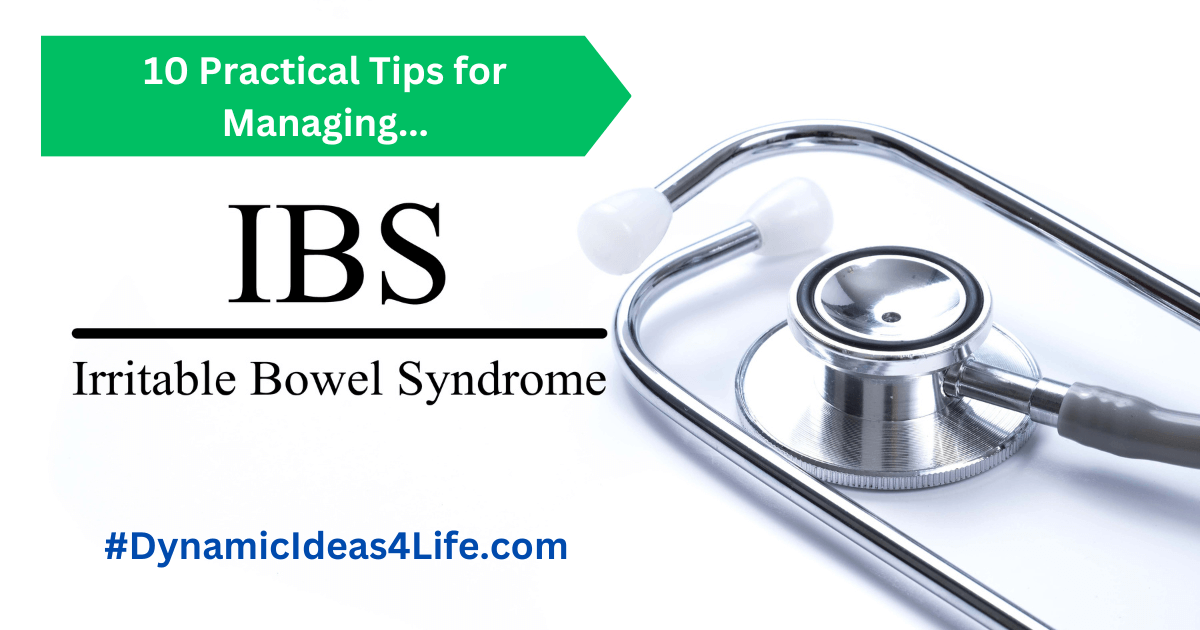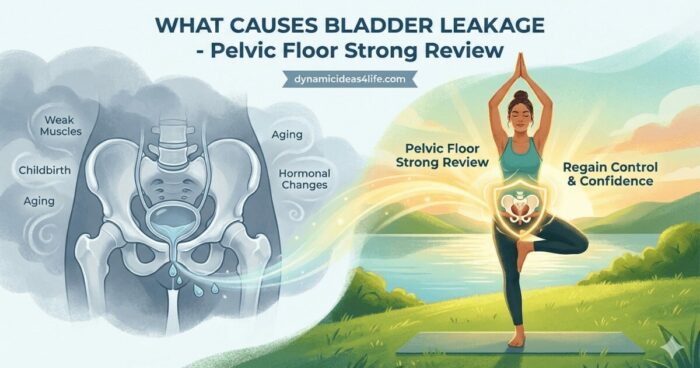
Managing IBS symptoms is crucial for improving the quality of life for those affected by the condition. The symptoms can be unpredictable and disruptive, causing discomfort and distress. By understanding the condition and implementing strategies to manage symptoms, individuals with IBS can regain control over their lives and enjoy a better quality of life.
For those affected IBS is characterized by a variety of symptoms, including abdominal pain, bloating, diarrhea, and constipation. These symptoms can have a significant impact on daily life, making it difficult to engage in normal activities and enjoy a good quality of life.
However, with proper management and lifestyle changes, individuals with IBS can experience relief from their symptoms and improve their overall well-being. Something we will look to explore further in today’s post…
10 Practical Tips for Managing IBS Symptoms
IBS is classified as a functional gastrointestinal disorder, which means that there is no structural or biochemical abnormality that can be identified as the cause of the symptoms. It is believed to be a result of a combination of factors, including abnormal muscle contractions in the intestines, increased sensitivity to pain, and changes in the gut microbiome.
The most common symptoms experienced by individuals with IBS include abdominal pain or discomfort, bloating, gas, diarrhea, and constipation. These symptoms can vary in severity and frequency from person to person.
In addition to the physical symptoms, IBS can also have a significant impact on mental health and overall well-being. Many individuals with IBS experience anxiety, depression, and reduced quality of life due to their symptoms.
Diet and Nutrition: Key Considerations for Managing IBS
Diet plays a crucial role in managing IBS symptoms. A balanced diet that includes a variety of foods from different food groups is important for overall health and well-being. However, certain foods can trigger or worsen IBS symptoms in some individuals. So, It is important to identify and avoid these trigger foods to manage symptoms effectively.
Some common trigger foods for individuals with IBS include fatty foods, spicy foods, caffeine, alcohol, and certain types of carbohydrates, such as those found in wheat, onions, and beans.
It is recommended to keep a food diary to track symptoms and identify trigger foods. By eliminating or reducing the consumption of these trigger foods, individuals with IBS can experience significant relief from their symptoms.
Fiber is an important component of a healthy diet, but it can also worsen symptoms for some individuals with IBS. It is important to find the right balance of fiber intake to manage symptoms effectively.
Soluble fiber, found in foods like oats, fruits, and vegetables, can help regulate bowel movements and reduce diarrhea. But, on the other hand, insoluble fiber, found in foods like whole grains and nuts, can increase stool bulk and worsen constipation.
It is recommended to work with a healthcare professional or registered dietitian to determine the right amount and type of fiber for individual needs.
Identifying Trigger Foods Foods that Aggravate IBS Symptoms
Keeping a food diary is a helpful tool for identifying trigger foods that aggravate IBS symptoms. By recording what you eat and any symptoms experienced after each meal or snack, you can start to identify patterns and make connections between certain foods and your symptoms.
When keeping a food diary, it is important to be as detailed as possible. Include information about portion sizes, cooking methods, and any additional ingredients or condiments used.
Also note any other factors that may have influenced your symptoms, such as stress levels or physical activity.
Common trigger foods for individuals with IBS include high-fat foods, spicy foods, caffeine, alcohol, artificial sweeteners, and certain types of carbohydrates known as FODMAPs (fermentable oligosaccharides, disaccharides, monosaccharides, and polyols).
FODMAPs are found in a variety of foods, including wheat, onions, garlic, beans, and certain fruits and vegetables. By identifying and avoiding these trigger foods, individuals with IBS can experience significant relief from their symptoms.
It is important to note that trigger foods can vary from person to person. What may trigger symptoms for one individual may not affect another. It is recommended to work with a healthcare professional or registered dietitian to develop an individualized dietary plan that takes into account your specific triggers and needs.
Stress Management Techniques: Reducing Anxiety and its Impact on IBS
Stress is known to exacerbate IBS symptoms. When we are stressed, our bodies release stress hormones that can affect the functioning of the digestive system. This can lead to increased sensitivity to pain, changes in bowel movements, and other IBS symptoms.
Managing stress is an important part of managing IBS symptoms. There are several techniques that can help reduce anxiety and promote relaxation. Meditation is a popular stress management technique that involves focusing the mind on a specific object or thought to achieve a state of calm and relaxation.
Deep breathing exercises can also help reduce stress by slowing down the heart rate and promoting relaxation.
Yoga is another effective stress management technique that combines physical postures, breathing exercises, and meditation. It has been shown to reduce anxiety and improve overall well-being in individuals with IBS.
In addition to these techniques, therapy, and counseling can also be beneficial for managing stress and IBS symptoms. Cognitive-behavioral therapy (CBT) is a type of therapy that focuses on changing negative thought patterns and behaviors that contribute to stress and anxiety.
It has been shown to be effective in reducing IBS symptoms and improving quality of life.
How Regular Exercise Can Help Alleviate IBS Symptoms
Regular exercise has been shown to have numerous benefits for individuals with IBS. It can help alleviate symptoms, improve overall well-being, and reduce stress and anxiety.
Exercise helps stimulate the muscles in the digestive system, promoting regular bowel movements and reducing symptoms of constipation. It can also help reduce bloating and gas by improving digestion and reducing the amount of time it takes for food to pass through the intestines.
Types of exercise that may be beneficial for individuals with IBS include low-impact activities such as walking, swimming, and cycling. These activities are gentle on the body and can be easily incorporated into a daily routine. Yoga and Tai Chi are also beneficial for individuals with IBS, as they combine physical movement with relaxation techniques.
It is important to start slowly and gradually increase the intensity and duration of exercise. It is also important to listen to your body and stop if you experience any pain or discomfort.
It is recommended to consult with a healthcare professional before starting any new exercise program, especially if you have any underlying health conditions.
Medication Options for IBS Relief
There are several medications available that can help manage IBS symptoms. These medications work in different ways to alleviate symptoms and improve quality of life.
Over-the-counter medications, such as antidiarrheal medications and laxatives, can be used to manage specific symptoms of IBS. Antidiarrheal medications can help reduce diarrhea, while laxatives can help relieve constipation.
However, It is important to use these medications as directed and consult with a healthcare professional if symptoms persist or worsen.
Prescription medications may also be used to manage IBS symptoms. These medications include antispasmodics, which help relax the muscles in the intestines and reduce abdominal pain, and antidepressants, which can help regulate bowel movements and reduce pain.
How Drinking Enough Water Can Improve IBS Symptoms
Hydration plays a crucial role in digestion and can have a significant impact on IBS symptoms. Dehydration can lead to constipation and worsen symptoms such as bloating and abdominal pain.
It is important to drink enough water throughout the day to stay hydrated. The recommended daily water intake for individuals with IBS is at least 8 cups (64 ounces) of water per day. However, individual needs may vary depending on factors such as age, weight, activity level, and climate.
In addition to drinking water, it is also important to limit the consumption of dehydrating beverages such as caffeine and alcohol. These beverages can increase urine production and lead to dehydration.
Tips for staying hydrated throughout the day include carrying a water bottle with you, setting reminders to drink water, and incorporating hydrating foods into your diet, such as fruits and vegetables.
Sleep and IBS Tips for Minimizing Symptoms
Sleep plays a crucial role in overall health and well-being, and it can have a significant impact on IBS symptoms. Lack of sleep or poor sleep quality can worsen symptoms such as fatigue, irritability, and difficulty concentrating.
There are several strategies that can help improve sleep quality for individuals with IBS. Establishing a bedtime routine can signal to your body that it is time to wind down and prepare for sleep. This can include activities such as reading, taking a warm bath, or practicing relaxation techniques.
Creating a sleep-friendly environment is also important for promoting better sleep. This includes keeping the bedroom cool, dark, and quiet, using comfortable bedding and pillows, and minimizing distractions such as electronic devices.
Relaxation techniques, such as deep breathing exercises and meditation, can also help promote better sleep. These techniques can help reduce stress and anxiety, allowing for a more restful night’s sleep.
If sleep problems persist or worsen, it is recommended to consult with a healthcare professional. They can help identify any underlying causes of sleep disturbances and develop a treatment plan to improve sleep quality.
Building a Support Network: The Benefits of Connecting with Others Living with IBS
Living with IBS can be challenging, and it is important to have a support network in place. Connecting with others who understand the challenges of living with IBS can provide validation, support, and practical advice.
There are several online and in-person support groups available for individuals with IBS. These groups provide a safe space to share experiences, ask questions, and learn from others who are going through similar challenges. These groups can provide valuable resources and information about managing IBS symptoms and improving your quality of life.
In addition to support groups, it can also be helpful to connect with friends, family members, or healthcare professionals who can provide emotional support and practical assistance.
Managing IBS in Social Situations
Managing IBS symptoms in social situations can be challenging, but with some planning and preparation, it is possible to navigate these situations successfully.
When dining out at restaurants, it is helpful to research the menu ahead of time and identify options that are IBS-friendly. Look for dishes that are low in fat, spice, and FODMAPs. It is also important to communicate your dietary needs to the restaurant staff and ask for modifications if necessary.
When traveling, it is important to plan ahead and pack snacks or meals that are safe for your dietary needs. It can also be helpful to research restaurants or grocery stores at your destination that offer IBS-friendly options. It is important to listen to your body and take breaks when needed to rest and manage symptoms.
Social events can be challenging for individuals with IBS, as they often involve food and can be stressful. It is important to communicate your needs and limitations to the host or organizer of the event. You can also bring your own food or snacks to ensure that you have safe options available. It is also helpful to practice stress management techniques, such as deep breathing or meditation, before and during the event.
Conclusion
Managing IBS symptoms is crucial for improving the quality of life for individuals with the condition. By understanding the condition, implementing strategies to manage symptoms, and seeking support from healthcare professionals and others living with IBS, individuals with IBS can regain control over their lives and enjoy a better quality of life.
It is important to remember that managing IBS is a journey, and what works for one person may not work for another. It may take time and experimentation to find the right combination of strategies that work best for you. It is recommended to work closely with a healthcare professional or registered dietitian to develop an individualized treatment plan that takes into account your specific needs and goals.
With proper management and support, individuals with IBS can live a fulfilling and enjoyable life.






Anxiety and Depression BiOptimizers blood pressure supplements blood sugar control blood sugar support supplements cognitive function digital products Dr Sam Robbins Exercise Gut Health Gut Health While Travelling Health Tips for Travelling Healthy Living heart health HFL how to lower blood sugar levels How To Lower Cholesterol insulin resistance joint health supplement keto dieting Keto Diet Weight Loss leaky gut supplements leptin resistance list Magnesium deficiency Matt Gallant mental health multivitamins Nootopia Nootropics nutrient supplements Probiotics Probiotic Supplements reverse type 2 diabetes stress and anxiety stress relief Supplements vitabalance vitapost Wade Lightheart weight loss articles weight loss diet plans weight loss product reviews weight loss supplements weight loss tea






